Select Language
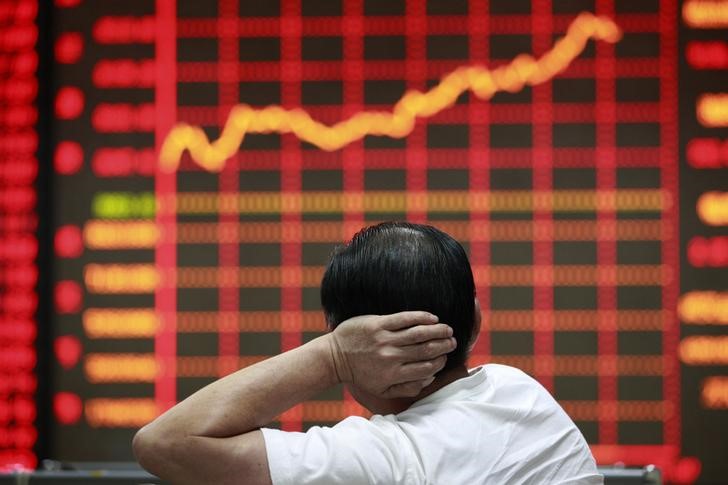
Asian stocks rose on Monday, with China in the lead after Beijing and Washington announced that they had reached a trade deal, while a ceasefire between India and Pakistan also primed the Nifty for strong gains.
U.S. stock index futures also rose sharply in Asian trade, with NQM25 up nearly 2% after Chinese and U.S. officials signaled on Sunday that a trade deal had been met, and that more details will be released later on Monday.
But gains in some indexes were held back by a drop in pharmaceutical stocks, after U.S. President Donald Trump said he will sign an executive order to slash U.S. drug prices.
Among major individual stocks, chipmaker TSMC (TW:2330) (NYSE:TSM) rose 1% in Taiwan trade after it posted record-high sales for April on Friday.
China stocks surge on US trade deal
China’s Shanghai Shenzhen CSI 300 and Shanghai Composite indexes added about 1.1% and 0.9%, respectively, while Hong Kong’s Hang Seng outperformed with a 1.5% jump.
U.S.officials said recent talks in Geneva, Switzerland, had gone well, and that a trade deal with China, to lower America’s trade deficit, had been reached.
Chinese officials also flagged welcome progress in the talks, and said that they will make a joint announcement with the U.S. later on Monday.
A potential trade deal marks a major deescalation in a bitter trade war between the world’s biggest economies, after they slapped trade tariffs of over 100% on each other in April.
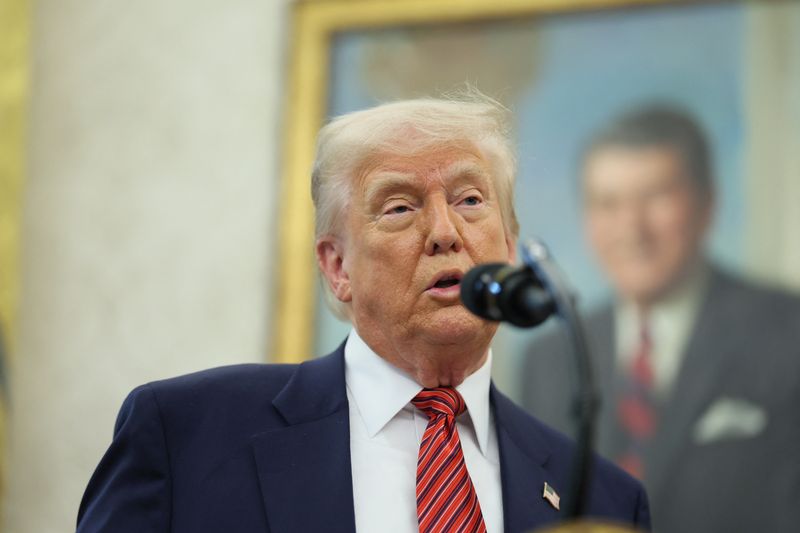
President Donald Trump announced on Sunday that he would sign an executive order Monday morning to slash U.S. prescription drug prices by aligning them with the lowest prices paid globally.
Posting on Truth Social, Trump criticized pharmaceutical companies for decades of inflated pricing. He said the U.S. has long paid far more for prescription medicines than peer countries, with some treatments costing five to ten times more despite being manufactured by the same companies in the same facilities.
“Prescription Drug and Pharmaceutical prices will be REDUCED, almost immediately, by 30% to 80%,” he wrote.
The order, Trump said, will implement a “Most Favored Nation” policy, compelling U.S. drug prices to match those of countries that pay the least for the same medications.
He claimed the move would save the country “TRILLIONS OF DOLLARS” and reduce healthcare costs for Americans by numbers never even considered.
Trump claimed that drug prices would increase across the globe to facilitate a decrease in U.S. prices, although he did not provide any details on how this would happen.
The U.S. President had in his first term also attempted to launch a drug pricing program based on international prices, although this was blocked by a court.
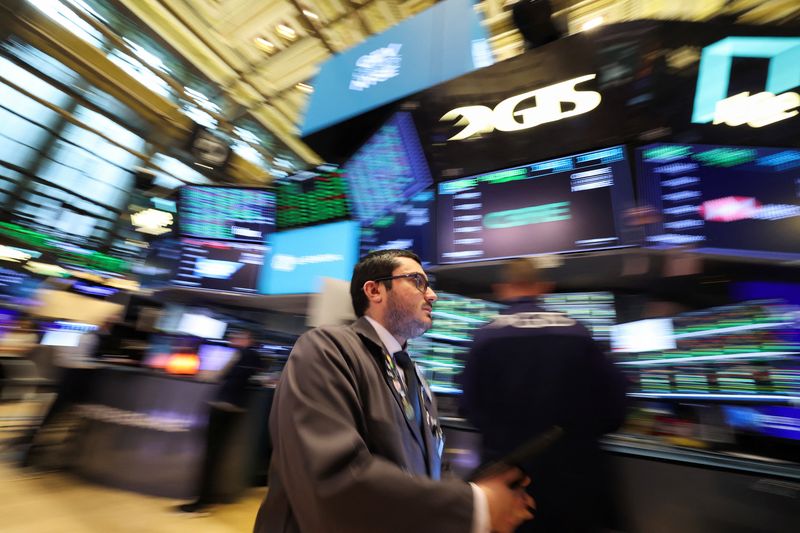
U.S. stock futures rose sharply on Sunday evening after the White House announced a trade deal with China had been reached following high-level meetings in Geneva this weekend, although no details of the agreement were released.
Dow futures were up 1% at 41,736.0 points, S&P 500 futures were up 1.2% at 5,745.0 points, and Nasdaq futures were up 1.5% at 30,438.75 points by 19:07 ET (23:07 GMT).
Gains in futures come after a positive week on Wall Street, as the prospect of a Sino-U.S. trade deal lifted spirits and spurred buying into risk-driven assets.
A mostly positive first-quarter earnings season had also lifted Wall Street in recent weeks, with prints from Home Depot (NYSE:HD), Palo Alto Networks (NASDAQ:PANW), Lowe’s (NYSE:LOW), Target, and Snowflake (NYSE:SNOW) due in the coming days.
US-China trade deal reached in Switzerland
U.S. Treasury Secretary Scott Bessent and Trade Representative Jamieson Greer said on Sunday afternoon that a trade deal had been struck with China, although they did not offer any more details.
“We’re confident that the deal we struck with our Chinese partners will help us to work toward resolving [the trade deficit],” Greer said in a statement posted to the White House’s website.
“It’s important to understand how quickly we were able to come to agreement, which reflects that perhaps the differences were not so large as maybe thought,” Greer added.
Bessent also flagged "substantial progress between the U.S. and China in the very important trade talks," adding that he spoke to President Donald Trump and that there will be a complete briefing on Monday morning.
Chinese state media said that Beijing and Washington will issue a joint statement over the trade talks on Monday. Li Chenggang, China’s vice minister of Commerce, was quoted saying that "no matter when this statement is released, it’s going to be big news and good news for the world."
The U.S. currently has a 145% tariff on Chinese imports, and recent reports suggested that this could be reduced to around 50%, although President Trump said on Friday a number in the 80% range “seems right.”
Analysts are already calling the development a positive step in the right direction.
“While the details and framework for the US/China trade deal will be key and discussed tomorrow morning, this is a huge positive in the right direction for the markets and more progress has come out of these Swiss talks than even the bulls were hoping for heading into Friday night,” Wedbush tech analyst Dan Ives said Sunday following the news.
Trump to slash pharma prices
Trump said on Sunday that he plans to sign an executive order lowering prescription drug and pharmaceutical prices by between 30% and 80%.
Trump said he will "be signing one of the most consequential executive orders in our Country’s history," in the White House at 9:00 am on Monday morning.
Trump claimed that pharma prices will "rise throughout the world" in order to bring fairness to America.
In other pharma news, Eli Lilly and Company (NYSE:LLY) said that its Zepbound weight loss drug had outperformed rival Novo Nordisk’s (NYSE:NVO) Wegovy in a recent head-to-head trial.
India and Pakistan ceasefire
In another potential market-moving development, India and Pakistan agreed to a ceasefire after increased tensions in recent days. U.S. President Donald Trump said U.S.-led mediation allowed cooler heads to prevail.
“After a long night of talks mediated by the United States, I am pleased to announce that India and Pakistan have agreed to a FULL AND IMMEDIATE CEASEFIRE,” Trump said on Saturday. Pakistan praised the U.S.’s role in the ceasefire, although India downplayed it.
The ceasefire appeared to be holding over the past 24 hours, although both India and Pakistan had accused each other of violations.
Ambar Warrick contributed to this report.

Gold prices rose in Asian trade on Friday, rebounding slightly from two days of sharp losses, as investors weighed the impact of the U.S.-U.K. trade deal and cautiously awaited upcoming China trade talks.
Gold fell in early Asia hours, but reversed course to edge higher, as analysts were sceptical about further de-escalation post the U.K. trade deal.
As of 01:44 ET (05:44 GMT), spot gold rose 0.4% to $3,320.95 per ounce, while gold futures expiring in June gained 0.5% to $3,329.24 an ounce.
The yellow metal was set to jump more than 2% this week, as investors saw increased violatlity, with prices gaining sharply at the start of the week on new U.S. tariff threats on pharma and foreign-made movies.
Trump signs U.K. trade framework deal; signals negotiations with China
President Donald Trump on Thursday signed a framework for a trade deal with the United Kingdom, under which the 10% tariff imposed on goods imported from the U.K. remains in place, while the UK agreed to lower its tariffs to 1.8% from 5.1%.
Trump also said he expects substantive negotiations between the U.S. and China. Officials from both counties were set to meet over the weekend for trade talks.
Commerce Secretary Howard Lutnick said in media interviews that the U.S. plans dozens of trade deals soon but will likely keep a universal 10% tariff.
Gold, which usually gains in times of uncertainty, fell earlier due to signs of easing trade tensions, but was supported by prevailing caution ahead of U.S.-China talks.
Analysts at ING said they were sceptical that the UK’s deal would herald a much broader easing in trade tensions.
“A de-escalation with China is realistically the only thing that can meaningfully move the dial on the tariff hit,” they added.
The U.S. dollar index was slightly weaker in Asian trading on Friday, making gold cheaper for foreign buyers.
Among other precious metals, Silver Futures were muted at $32.653 an ounce, while platinum futures rose 0.5% to $986.55 an ounce.
Copper prices drop despite resilient China trade data
Copper prices fell slightly on Friday as investors were cautious about the outcome of trade talks with Beijing.
Traders also assessed data, showing a slightly lower than expected Chinese trade balance, but both exports and imports remained resilient despite tariff headwinds.
Benchmark copper futures on the London Metal Exchange fell 0.4% to $9,395.20 a ton, while copper futures expiring in July dropped 1.4% to $4.540 a pound.
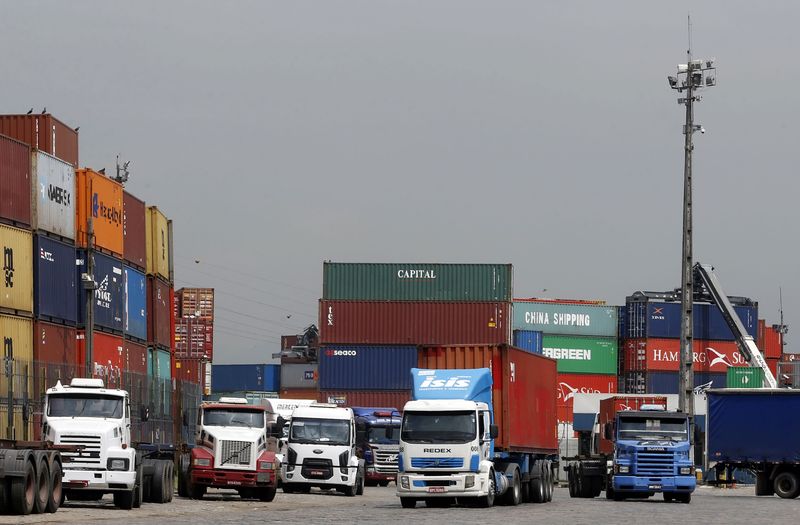
China’s exports grew much more than expected in April, indicating that a bitter trade war with the U.S. was having only a limited impact on export volumes, although the country’s trade balance shrank more than expected.
China’s imports also shrank less than expected, signaling that local demand was so far facing limited headwinds from Beijing’s 125% tariffs on U.S. goods.
Exports grew 8.1% year-on-year in April, government data showed on Friday. The reading was much higher than expectations of 1.9%, but slowed from the 12.4% jump seen in the prior month.
This brought China’s trade balance down to $96.18 bln from $102.64 billion the prior month. The figure was also lower than expectations of $97 billion.
Friday’s strong export reading indicated that a bitter trade war with the U.S. so far had a limited impact on Beijing’s export volumes. The reading also came as Beijing rolled out more measures to support exports, most notably a sharp devaluation of the yuan through April.
But a contraction in China’s trade balance signaled that monetary returns from its exports were slowing, with exporters either shouldering some of the burden of the U.S. tariffs, or sending their goods elsewhere at discounted rates.
China’s imports also slowed substantially less than expected, pointing to some resilience in local demand for overseas goods, despite steep Chinese trade tariffs on U.S. goods. China imposed a 125% tariff on U.S. imports, in retaliation for a 145% tariff levied by President Donald Trump in April.
While Friday’s data does reflect some resilience in Chinese trade, exports also likely remained underpinned by the U.S. exempting several key items from Trump’s tariffs, such as electronics. China has also exempted several goods from its retaliatory tariffs.
Friday’s trade data comes with trade talks between U.S. and Chinese officials set to begin over the weekend. Trump on Thursday said he was open to slashing his tariffs on China if the talks went well, with a report suggesting he could bring the duty down to 50%.
Chinese Vice Minister of Foreign Affairs Chunying Hua said on Friday that the U.S. tariffs were unsustainable and the country was prepared for any outcome from the trade talks.
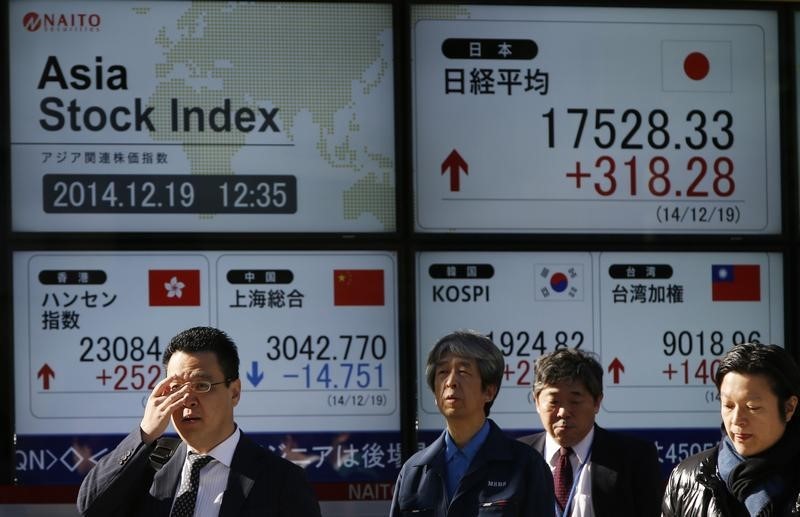
Most Asian stock markets climbed on Friday, led by Japan, as a new U.S.-UK trade deal framework sparked hopes for tariff negotiations with other countries, especially China.
Investors also assessed China’s monthly trade balance data to assess the impact of hefty U.S. tariffs.
Moreover, regional markets took cues from major Wall Street indexes, which gained overnight on trade deal optimism.
U.S. stock index futures were largely muted in Asian trading on Friday.
Nikkei jumps over 1% as US-UK trade deal stokes broader optimism
President Donald Trump on Thursday signed a framework for a trade deal with the United Kingdom, under which the 10% tariff imposed on goods imported from the UK remains in place, while the UK agreed to lower its tariffs to 1.8% from 5.1%. Moreover, steel and aluminum imports to the U.S. would be exempt from Trump’s 25% levy.
Trump also said he expects substantive negotiations between the U.S. and China. Officials from both counties were set to meet over the weekend for trade talks.
Soon after the announcement, Commerce Secretary Howard Lutnick said in media interviews that the U.S. plans dozens of trade deals soon but will likely keep a universal 10% tariff.
Most Asian stocks cheered these signs of easing global trade tensions.
Japan’s Nikkei 225 index jumped 1.5%, while TOPIX advanced 1.3%. A weaker yen against the dollar also provided support.
South Korea’s KOSPI was largely unchanged, while the Philippines’ PSEi Composite index jumped 1%.
Australia’s S&P/ASX 200 rose 0.5%, and Singapore’s Straits Times index added 0.6%.
India’s Nifty 50 Futures edged 0.2% higher amid escalating geopolitical tensions with neighboring Pakistan.
India said it neutralized Pakistani drone and missile attacks on military sites, including Jammu, Pathankot, and Udhampur on Thursday night, calling it an escalation in tensions.
China shares edge lower despite resilient trade balance data
China’s Shanghai Composite index fell 0.3%, while the Shanghai Shenzhen CSI 300 declined 0.4%.
Hong Kong’s Hang Seng index also lost 0.4%.
Data on Friday showed that the Chinese trade balance grew slightly below expectations in April.
Exports fell to 8.1% from 12.4% a month ago, but were sharply above forecasts of a 1.9% rise.
Meanwhile, the decline in imports narrowed to 0.2%, from 4.3%, and beat analysts’ estimates of a 5.9% slump.
The data showed resilient domestic demand and foreign demand despite tariff headwinds. The figures were also likely supported by mutual tariff exemptions on key goods like electronics.
Investors now await the country’s consumer price index (CPI) inflation data, scheduled for release on Saturday.

U.S. stock futures were largely unchanged Thursday evening following a Wall Street rally driven by a new trade deal framework with the UK, while investors looked ahead for further agreements, including one with China.
S&P 500 Futures inched 0.1% lower to 5,677.0 points, while Nasdaq 100 Futures were largely muted at 20,135.75 points by 20:12 ET (00:12 GMT). Dow Jones Futures fell 0.2% to 41,397.0 points.
Wall St gains on US-UK trade deal framework; China agreement eyed
In the regular trading session on Thursday, the Dow Jones Industrial Average closed 0.6% higher, the S&P 500 index also climbed 0.6%, while the NASDAQ Composite jumped 1.1%
President Donald Trump on Thursday signed a framework for a trade deal with the United Kingdom, raising hopes that the Trump administration’s chaotic trade policies could soon be settling down.
Under the deal, the 10% tariff that was imposed on goods imported from the UK remains in place, while the UK agreed to lower its tariffs to 1.8% from 5.1% and provide further access to U.S. goods.
Moreover, steel and aluminum imports to the U.S. would be exempt from Trump’s 25% levy.
“The deal enables the President to offer the sense of flexibility that financial markets are craving. The reaction – higher equity prices, a stronger dollar, higher Treasury yields – shows that it has had the desired effect,” ING analysts said in a note.
However, analysts were sceptical that the UK’s deal would herald a much broader easing in trade tensions.
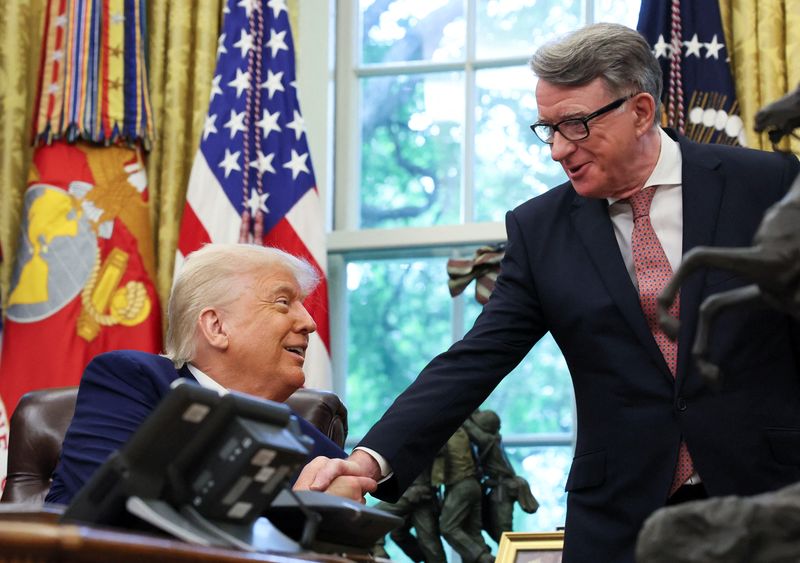
President Donald Trump confirmed a trade deal with the United Kingdom on Thursday. It is the first deal since reciprocal tariffs were announced on April 2nd. Importantly, the 10% base tariff will remain for the UK, providing a glimpse of a possible roadmap for future deals.
Trump and UK Prime Minister Sir Keir Starmer confirmed the deal during a phone call broadcast live. Trump highlighted that the new deal will raise $6 billion in External Revenue from the agreement and $5 billion in new export opportunities.
The two sides also announced the creation of an Aluminum and Steel trading zone and a secure pharmaceutical supply chain.
“Today is an incredible day for America as we deliver our first Fair, Open, and Reciprocal Trade Deal — Something our past Presidents never cared about,” Trump stated. “Together with our strong Ally, the United Kingdom, we have reached the first, historic Trade Deal since Liberation Day.”
As part of the deal, the UK has agreed to a $10 billion Boeing procurement deal. Shares of Boeing Co (NYSE:BA) rose 3% intraday.
The deal will provide a 10% tariff on a quota of 100,000 UK auto exports to the U.S. When answering a question, the U.S. President said there is "a good commercial for Rolls-Royce (OTC:RYCEY)." Rolls-Royce shares closed over 3% higher in today’s session.
U.S. Secretary of Agriculture Brooke Rollins said the deal will “exponentially increase” U.S. beef exports to the UK.
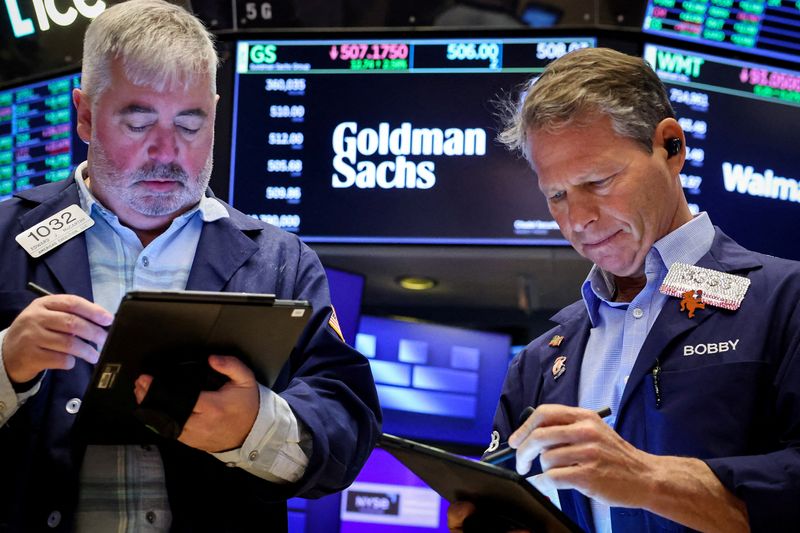
U.S. stock futures climb, bolstered by media reports that the White House will soon announce a trade agreement with the U.K. The Federal Reserve leaves interest rates steady, but Fed Chair Jerome Powell warns that aggressive U.S. tariffs are "likely" fueling inflation and unemployment risks. Carmaker Toyota warns that its annual operating profit could fall due to the levies.
1. Futures rise
U.S. stock futures tick higher, as investors gauge reports of an upcoming trade deal between the U.S. and Britain and assess interest rate commentary from Federal Reserve Chair Jerome Powell.
By 03:46 ET (07:46 GMT), the Dow futures contract had jumped by 221 points, or 0.5%, S&P 500 futures had gained 41 points, or 0.7%, and Nasdaq 100 futures had risen by 202 points, or 1.0%.
The main averages advanced on Wednesday, buoyed by reports that U.S. export restrictions on artificial intelligence chips would be somewhat loosened. Semiconductor stock rallied late in the session, following a bout of volatility in the build-up to the Fed’s latest rate decision.
In individual stocks, Walt Disney (NYSE:DIS) shares rose, pulling up the blue-chip Dow Jones Industrial Average, after the entertainment behemoth’s second-quarter earnings and outlook topped estimates despite ongoing worries over economic uncertainty.
2. U.S. to announce trade deal with Britain - reports
President Donald Trump is anticipated to reveal the outlines of a trade agreement with the U.K. on Thursday, according to media reports.
The potential announcement, which would be the first trade-related agreement secured by the White House since it slapped tariffs on friends and foes alike, is expected to be a framework of a deal with tariff adjustments, the Wall Street Journal reported.
Writing on social media on Wednesday, Trump said the statement will revolve around a "MAJOR TRADE DEAL WITH REPRESENTATIVES OF A BIG, AND HIGHLY RESPECTED, COUNTRY", adding that it would be "THE FIRST OF MANY".
Details of the agreement were not immediately clear, the New York Times (NYSE:NYT) said, adding that both countries have discussed bringing down British tariffs on U.S. cars and farm products and scrapping British duties on U.S. tech firms.
White House officials have been pushing to notch trade deals with dozens of countries during a 90-day delay to Trump’s heightened "reciprocal" tariffs. However, despite the postponement, several tariffs are still in place, including universal 10% levies and other trade taxes on items like steel, aluminum and autos.
3. Fed warns of inflation, unemployment risks
The rate-setting Federal Open Market Committee left borrowing costs unchanged on Wednesday, as it flagged concerns that inflation and unemployment risks had climbed.
In a post-meeting press conference, Fed Chair Jerome Powell argued that Trump’s aggressive tariff agenda is "likely" to lead to push prices, weigh on job growth, and dent the broader the economy. Taken together, the outlook resembles a period of so-called "stagflation" in the world’s largest economy.
At the moment, most of Trump’s elevated "reciprocal" levies -- not including eye-watering duties of at least 145% on Chinese imports -- have been delayed until July. But Powell’s comments suggest that Fed officials remain wary that the tariffs could snap back into place later this year.
Heading into its latest rate decision, the Fed had been grappling with relatively mixed data. U.S. gross domestic product, a key gauge of growth, contracted in the first quarter, although other indicators showed that consumer spending and the labor market remain resilient.
Crucially, the Fed’s most recent statement "gave no hint" that it was considering more cuts to rates, said Paul Ashworth, Chief North America Economist at Capital Economics. Borrowing costs have stood at a target range of 4.25% to 4.5% since December.
Powell also noted that it was "not at all clear" what the appropriate response for monetary policy" should be at this time given the uncertainty around the tariffs.
4. Toyota warns of tariff hit
Japanese carmaker Toyota Motor (NYSE:TM) has warned that its profits could drop by a fifth in its current financial year due in large part to Trump’s tariffs.
The world’s best-selling auto manufacturer said it now projects that annual operating income will come in at 3.8 trillion yen ($26 billion), down from 4.8 trillion yen in its prior fiscal year.
CEO Koji Sato flagged that the murkiness around the future of the tariffs has made it difficult to plan for them, echoing comments from several other businesses during the latest quarterly earnings season. He noted that whether the tariffs are permanent or not is "not something we can decide".

NEW DELHI/ISLAMABAD (Reuters) -A blast was heard in Pakistan’s eastern city of Lahore on Thursday morning, according to broadcaster Geo TV and a Reuters witness, a day after Indian strikes at multiple locations in the country and fears of an escalation in conflict between the nuclear-armed neighbours.
There was no immediate word on the reason for the blast.
India hit "terrorist infrastructure" in Pakistan in the early hours of Wednesday, two weeks after it accused the Islamic nation of involvement in an attack in Indian Kashmir in which 26 people - mostly Hindu tourists - were killed.
Islamabad had denied the accusation and vowed to retaliate to the missile strikes, also saying it shot down five Indian aircraft. The Indian embassy in Beijing termed reports of fighter jets being shot down as "misinformation".
Pakistan says at least 31 of its civilians were killed and about 50 wounded in the strikes and in cross-border shelling that followed, while India says 13 of its civilians died and 43 were wounded.
The cross-border exchange of fire tapered off slightly overnight, Indian officials said.
India also conducted blackout drills in regions close to its border with Pakistan, including the northern city of Amritsar which houses the Golden Temple revered by Sikhs, in anticipation of retaliation to its strikes.
In Pakistan, meanwhile, most cities restored some normalcy and children returned to school, but in the border province of Punjab, hospitals and civil defence authorities remained on high alert.
Although Pakistan’s federal government has pledged to respond to India’s strikes, Defence Minister Khawaja Muhammad Asif told The New York Times (NYSE:NYT) on Wednesday that Pakistan was ready to de-escalate.
With India saying it would "respond" if Pakistan "responds", global powers have urged a calming of tensions. U.S. President Donald Trump said on Wednesday he hoped the countries could "work it out", adding he "will be there" if he can help.
The relationship between India and Pakistan has been fraught with tension since they gained independence from colonial Britain in 1947, and the countries have fought three wars, two of them over Kashmir.
The current escalation in tensions comes at a precarious time for Pakistan’s $350 billion economy, which is still recovering from an economic crisis that brought it to the brink of defaulting on external debt obligations in 2023 before it secured funding from the International Monetary Fund (IMF).

